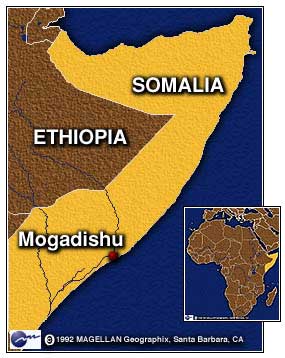
Gunmen shot dead a Somali lawmaker Saturday in Mogadishu, the speaker of parliament Mohamed Osman Jawari said.
"Mustaf Haji Mohamed was killed by elements that are known for cruelty," the speaker said, in what appeared to be a reference to the Al-Qaeda linked Shebab insurgents.
Witnesses said the lawmaker was gunned down after leaving a mosque in southern Mogadishu's Waberi district where he had performed his evening prayers.
"They shot him several times and escaped," Mohamed Adan, a witness said, adding that the lawmaker had died on his way to hospital.
"Merciless elements have shot and killed Mustaf Haji Mohamed," the parliament speaker Osman Jawari said in a statement.
"We send our condolences to the relatives of the victim and to the Somali people whose cause he served."
"Such acts will never deter us from fulfilling our responsibilities to serve the nation," he added.
While no one has so far claimed this latest attack, the Shebab have vowed to kill Somali government officials and the external forces propping up the administration.
The dead man was the father-in-law of former president Sharif Sheikh Ahmed.
He is the first lawmaker to be targeted since the new 275-member assembly was selected in August.
On Thursday, a double suicide attack in Mogadishu targeting an upmarket restaurant recently opened by Somalis from the diaspora killed 18 people.
Shebab spokesman Ali Mohamud Rage told AFP the restaurant bombing had been carried out by the group's supporters.
Among those killed in Thursday's attack were three journalists.
A fourth journalist, Hassan Yusuf Absuge of independent Radio Maanta, was gunned down on Friday in the Somali capital as he left the radio station after working a night shift.
No group has so far claimed responsibility for the murder of the journalist.
Press rights group Reporters Without Borders (RSF) has called 2012 the "deadliest year" on record for Somali journalists with 13 killed so far, surpassing 2009 when nine died.
After more than two decades of war, the seaside city has seen modest improvements since the Shebab left frontline fighting positions, with a boom in building and businesses.
However, the hardline Shebab fighters switched to guerrilla attacks -- including suicide bombings -- and remain a potent threat.
Earlier this month they killed three soldiers during a failed bid to assassinate the newly elected president Hassan Sheikh Mohamud.
But the Shebab faces growing pressure on the last major city they hold, the southern port of Kismayo, where Kenyan troops serving with the African Union force are closing in.
No comments:
Post a Comment